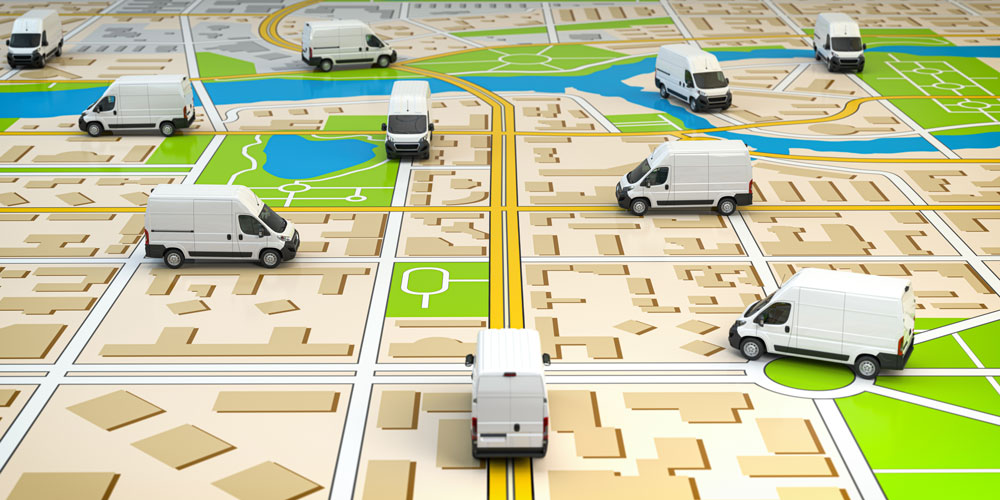When customers want HVAC services, they typically want them as soon as possible. Whether it’s desperation to get the furnace going again in the middle of winter or sweltering in a summer heat spell, HVAC repair clients want their systems fixed and they want your service technicians to arrive at their residence as soon as possible—or at least on time for the appointment you may have booked with them days in advance.
GPS vehicle trackers help your service people stay on track and on schedule to keep your customers happy. GPS tracking can also help you deal with certain kinds of problems with your fleet, such as detours for private business or stolen vehicles. But GPS Technologies can show you many more ways that GPS tracking can boost your bottom line.

GPS isn’t just about a red dot on a street map anymore
By now, everybody knows the basics of GPS. We use it to find our way to addresses we haven’t visited before. We use it to track our teenagers when they borrow the car for the evening.
But tracking location isn’t all that GPS can do for the owners of commercial vehicles. Modern GPS telematic technology can:
- Minimize drivetime. Your dispatcher can log into your GPS dashboard to monitor all of your service trucks on the same screen at the same time. With software installed by GPS Technologies, your dispatch office can reroute the nearest service technicians to the most pressing problems, taking road conditions and traffic into account.
- Reduce fuel costs. By updating as often as every three seconds, GPS reports speed as well as location. It can track tire pressure. You can use GPS tracking to reinforce good driving habits that limit speed to save fuel.
- Reinforce safe driving habits. GPS tracking can tell you when your vehicle experiences sudden acceleration or your driver hits the brakes. GPS tracking wired into your service vehicle’s onboard diagnostics can tell you when road conditions or driving habits are costing you more fuel, and when your vehicle takes an unusually sharp, fast turn. GPS can improve driver safety and lower your insurance costs. More importantly, you can use GPS tracking to reinforce safe driving and save money and lives.
- Reducing paperwork. GPS tracking doesn’t just tell you when your technicians arrive at your customer’s address. It can also tell you when they opened the door to get out of the vehicle to get to work. GPS tracking can automate billing for mileage and confirm billable hours spent on each job. It can keep you in compliance with federal electronic logging requirements for out-of-town jobs.
- Keeping up with vehicle maintenance. Your GPS tracking system can be integrated with your other management systems to remind you when vehicles need regularly scheduled maintenance. It can also notify you of every warning generated by on-board diagnostics, plus keep up with tire pressure.
- Dealing with lockouts remotely. GPS tracking gives you a way to let a driver in when they don’t have their keys.
- Increased customer satisfaction. GPS makes it easier to arrive at the job on time. It makes it easier for dispatch to locate trucks that have gone astray on their way to a service call. It gives you backup for questions about your billings.
What kind of impact does GPS tracking have on your bottom line?
Our experience with service fleets gives us some historical averages that give a good idea of just how big a difference GPS tracking can make for service fleets. On average:
- GPS tracking systems integrated with dispatch office management systems reduce drive time about 15 percent. That’s the difference made by being able to schedule appointments in the same neighborhood together and sending the closest truck to a job.
- Telematic GPS tracking, integrated with each vehicle’s onboard diagnostics, improves fuel efficiency on average about 18 percent. Part of this improvement comes from our clients’ ability to correct bad driving habits, like speeding and sudden acceleration. But most of this improvement comes from the power of GPS tracking to route vehicles around traffic congestion to reduce time spent idling.
- GPS tracking reduces windshield time, the amount of time drivers spend in their trucks instead of on the job, by about 25 percent. Improved communication among drivers, dispatchers, and customers means less time waiting for confirmation of the next service call.
- Engine idling time is reduced by 70 to 75 percent. Your dispatchers can keep service vehicles moving from one appointment to the next.
- Hard braking is reduced by 82 percent. Your GPS tracking system notifies your dispatch office every time an operator hits the brakes hard. These notifications help you prevent accidents with vehicle maintenance and operator training.
GPS fleet tracking doesn’t take long to pay for itself. Keeping just one vehicle from “falling off the radar” can prevent hundreds of dollars in lost billings or wages paid for time not spent on the job. The ability to track a stolen or missing vehicle can save your company thousands of dollars.
Got questions? GPS Technologies Have Answers!
Whether you have a fleet of one vehicle or you operate thousands of vehicles, GPS Technologies has the hardware, software, and industry experience you need. Contact us at (847) 382-5107 or ask for a custom quote.
